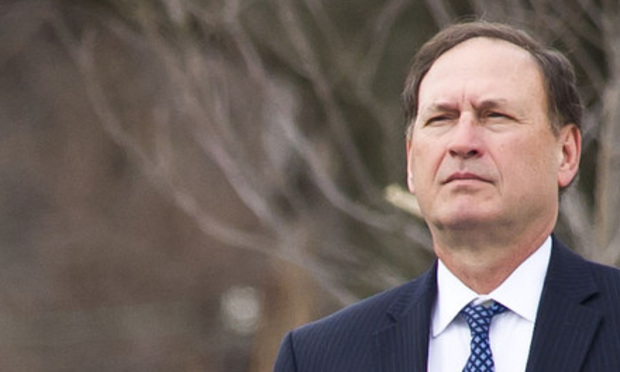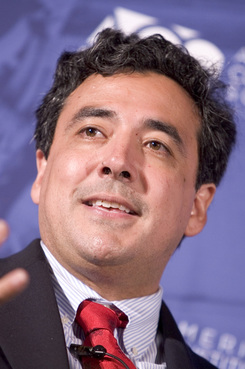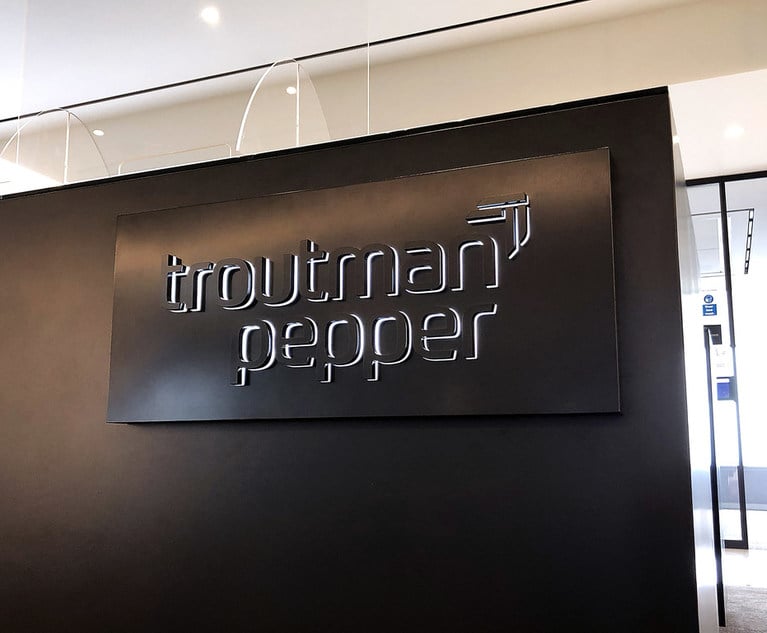US Justice Department Takes Alito's Side in New Stance Against Union Fees
By reversing the federal government's long-held position that "fair share" fees paid to public employee unions by nonmembers are lawful, the U.S. Justice Department sent an early holiday present to Justice Samuel Alito Jr., who has led recent attacks on the constitutionality of the fees. But maybe, in a long shot for unions, the late Justice Antonin Scalia will have the final word.
December 07, 2017 at 03:29 PM
7 minute read
 Justice Samuel Alito Jr. Credit: Diego M. Radzinschi / ALM
Justice Samuel Alito Jr. Credit: Diego M. Radzinschi / ALM
By reversing the federal government's long-held position that “fair share” fees paid to public employee unions by nonmembers are lawful, the U.S. Justice Department sent an early holiday present to Justice Samuel Alito Jr., who has led recent attacks on the constitutionality of the fees. But maybe, in a long shot for unions, the late Justice Antonin Scalia will have the final word.
Noel Francisco, the U.S. solicitor general, on Wednesday filed a friend-of-the-court brief that urged the justices to overrule a 40-year-old decision, Abood v. Detroit Board of Education. That decision rejected claims that the fees, paid to cover nonunion members' share of the costs of collective bargaining, violated the First Amendment.
 Solicitor General Noel Francisco. Credit: Diego M. Radzinschi/ The National Law Journal
Solicitor General Noel Francisco. Credit: Diego M. Radzinschi/ The National Law JournalLess than two years ago, the Justice Department, under the Obama administration, had defended the constitutionality of fair share fees in the high court in Friedrichs v. California Teachers Association. In March 2016, the court deadlocked in the case after the death of Scalia. Rebecca Friedrichs was represented by Francisco's former Jones Day partner, Michael Carvin.
The Justice Department's flipped position on the union fees question is the third time this term that Main Justice, led by U.S. Attorney General Jeff Sessions, has changed the government's course in a major case. The department now supports a class action ban in workplace arbitration agreements and Ohio's system for purging from its registration rolls inactive voters.
In his Janus brief on the government's new position, Francisco wrote:
Following the grant of certiorari in this case, the government reconsidered the question and reached the opposite conclusion. Largely for the reasons articulated by this court in Harris and during the argument in Friedrichs, the government's previous briefs gave insufficient weight to the First Amendment interest of public employees in declining to fund speech on contested matters of public policy. Abood's result is inconsistent with prevailing First Amendment precedent and should be overruled.
Some court observers noted Francisco's brief did not present any detailed justification to the court for such a major change coming so soon after the same office had defended Abood and for breaking with the position held by Republican and Democratic solicitors general over the last 40 years. One high-court veteran, speaking anonymously to protect relationships at Main Justice, called the Justice Department's maneuvering “one of the most audacious things I've ever seen a solicitor general do.”
Francisco's reference in his brief to “Harris” was to the high court's 2014 decision in Harris v. Quinn. In that case, Alito, leading a 5-4 majority, outlined his problems with Abood. Two years before that decision, Alito in Knox v. Service Employees International Union also signaled his belief that Abood was wrongly decided.
Taken together, the decisions ignited an effort by organizations such as the National Right to Work Legal Defense Foundation, which is counsel at the Supreme Court to Mark Janus, and the Competitive Enterprise Institute to get cases challenging Abood to the high court as quickly as possible.
In her dissenting opinion in Harris, Justice Elena Kagan wrote: “Not until two years ago, in Knox v. Service Employees, did the court so much as whisper (there without the benefit of briefing or argument) that it had any misgivings about Abood.”
During last term's arguments in Friedrichs, which took place a month before Scalia's death, the unions appeared destined to lose at the hands of a conservative 5-4 majority. But some observers and scholars questioned whether Scalia would rule with his fellow conservatives because of a 1991 opinion involving Abood—Lehnert v. Ferris Faculty Association.
That opinion now is at the center of an amicus brief in the Janus case. The amicus parties, Reagan administration Solicitor General Charles Fried of Harvard Law School and Yale Law's Robert Post, submitted their brief in support of neither side.
In Lehnert, the justices struggled with the types of expenses for which a union could constitutionally require contributions from non-union members.
Scalia, concurring and dissenting in part, wrote: “What is distinctive, however, about the 'free riders' who are nonunion members of the union's own bargaining unit is that in some respects they are free riders whom the law requires the union to carry—indeed, requires the union to go out of its way to benefit, even at the expense of its other interests.”
 Antonin Scalia, 2013. Credit: Diego M. Radzinschi / NLJ
Antonin Scalia, 2013. Credit: Diego M. Radzinschi / NLJScalia's solution? “I would hold that contributions can be compelled only for the costs of performing the union's statutory duties as exclusive bargaining agent.”
Scalia said that it is the state that is imposing costs on the union and it is the state's power to compel non-members to support the union financially in order to eliminate the inequity that would otherwise arise from mandated free-ridership. That power, he added, “does not go beyond the expenses incurred in discharge of the union's 'great responsibilities' in 'negotiating and administering a collective bargaining agreement and representing the interests of employees in settling disputes and processing grievances.'”
Scalia's opinion was joined by Justices Anthony Kennedy, Sandra Day O'Connor and David Souter.
Fried and Post, represented by former Solicitor General Seth Waxman of Wilmer Cutler Pickering Hale and Dorr, argued that Scalia's “statutory-duties” test answers the problems the high court faced in Harris and in Abood.
Waxman said that “the test protects against the compelled support of lobbying, advertising, and other speech outside of a state's system for managing its workforce. The test also preserves the principles that inform the broad range of the court's compulsory-fee cases, which recognize that the government's interests in funding comprehensive regulatory regimes through mandatory fees are entirely compatible with the First Amendment interests of dissident fee payers.”
The high court has not scheduled an argument date yet for the Janus case but it is expected to be heard sometime in February.
The Justice Department's brief in Janus v. American Federation of State, County and Municipal Employees is posted below.
This content has been archived. It is available through our partners, LexisNexis® and Bloomberg Law.
To view this content, please continue to their sites.
Not a Lexis Subscriber?
Subscribe Now
Not a Bloomberg Law Subscriber?
Subscribe Now
NOT FOR REPRINT
© 2025 ALM Global, LLC, All Rights Reserved. Request academic re-use from www.copyright.com. All other uses, submit a request to [email protected]. For more information visit Asset & Logo Licensing.
You Might Like
View All
Troutman Pepper Says Ex-Associate Who Alleged Racial Discrimination Lost Job Because of Failure to Improve
6 minute read
Trump Fires EEOC Commissioners, Kneecapping Democrat-Controlled Civil Rights Agency

Trump’s Firing of NLRB Member Could Spark Review of Supreme Court Precedent

Testing Legal Authority, Trump Fires NLRB Member, Leaving Panel Without Quorum
3 minute readTrending Stories
- 1SEC Sued for Failing to Reveal Records Involving Simpson Thacher Attorney
- 2Lawsuit accuses University of California of racial discrimination in admissions
- 3Data Breaches in UK Legal Sector Surge, According to ICO Data
- 4PayPal Faces New Round of Claims; This Time Alleging Its 'Honey' Browser Extension Cheated Consumers
- 5Fired NLRB Member Seeks Reinstatement, Challenges President's Removal Power
Who Got The Work
J. Brugh Lower of Gibbons has entered an appearance for industrial equipment supplier Devco Corporation in a pending trademark infringement lawsuit. The suit, accusing the defendant of selling knock-off Graco products, was filed Dec. 18 in New Jersey District Court by Rivkin Radler on behalf of Graco Inc. and Graco Minnesota. The case, assigned to U.S. District Judge Zahid N. Quraishi, is 3:24-cv-11294, Graco Inc. et al v. Devco Corporation.
Who Got The Work
Rebecca Maller-Stein and Kent A. Yalowitz of Arnold & Porter Kaye Scholer have entered their appearances for Hanaco Venture Capital and its executives, Lior Prosor and David Frankel, in a pending securities lawsuit. The action, filed on Dec. 24 in New York Southern District Court by Zell, Aron & Co. on behalf of Goldeneye Advisors, accuses the defendants of negligently and fraudulently managing the plaintiff's $1 million investment. The case, assigned to U.S. District Judge Vernon S. Broderick, is 1:24-cv-09918, Goldeneye Advisors, LLC v. Hanaco Venture Capital, Ltd. et al.
Who Got The Work
Attorneys from A&O Shearman has stepped in as defense counsel for Toronto-Dominion Bank and other defendants in a pending securities class action. The suit, filed Dec. 11 in New York Southern District Court by Bleichmar Fonti & Auld, accuses the defendants of concealing the bank's 'pervasive' deficiencies in regards to its compliance with the Bank Secrecy Act and the quality of its anti-money laundering controls. The case, assigned to U.S. District Judge Arun Subramanian, is 1:24-cv-09445, Gonzalez v. The Toronto-Dominion Bank et al.
Who Got The Work
Crown Castle International, a Pennsylvania company providing shared communications infrastructure, has turned to Luke D. Wolf of Gordon Rees Scully Mansukhani to fend off a pending breach-of-contract lawsuit. The court action, filed Nov. 25 in Michigan Eastern District Court by Hooper Hathaway PC on behalf of The Town Residences LLC, accuses Crown Castle of failing to transfer approximately $30,000 in utility payments from T-Mobile in breach of a roof-top lease and assignment agreement. The case, assigned to U.S. District Judge Susan K. Declercq, is 2:24-cv-13131, The Town Residences LLC v. T-Mobile US, Inc. et al.
Who Got The Work
Wilfred P. Coronato and Daniel M. Schwartz of McCarter & English have stepped in as defense counsel to Electrolux Home Products Inc. in a pending product liability lawsuit. The court action, filed Nov. 26 in New York Eastern District Court by Poulos Lopiccolo PC and Nagel Rice LLP on behalf of David Stern, alleges that the defendant's refrigerators’ drawers and shelving repeatedly break and fall apart within months after purchase. The case, assigned to U.S. District Judge Joan M. Azrack, is 2:24-cv-08204, Stern v. Electrolux Home Products, Inc.
Featured Firms
Law Offices of Gary Martin Hays & Associates, P.C.
(470) 294-1674
Law Offices of Mark E. Salomone
(857) 444-6468
Smith & Hassler
(713) 739-1250








